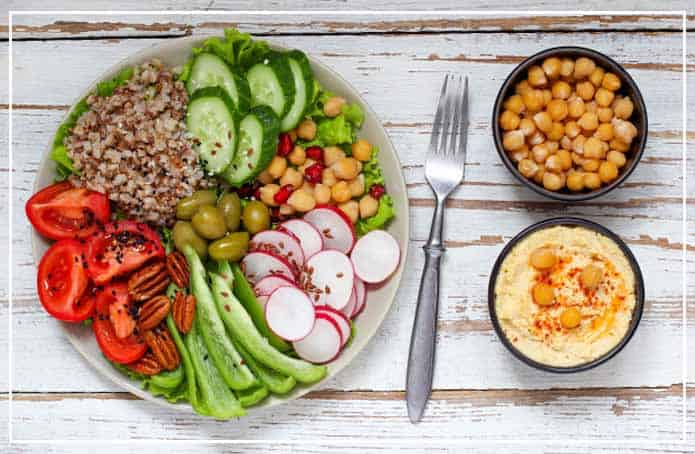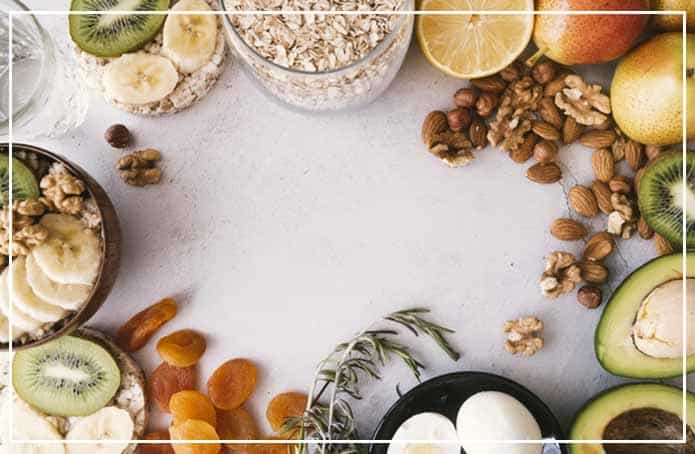A balanced diet refers to a diet that is consumed by one in an appropriate amount with the various combinations of foods. One requires carbohydrates, proteins, minerals, vitamins, fiber and water in adequate quantity.
The main constituents of diet are protein, carbohydrate, fat, vitamins, natural salts, fiber, and water. Each constituent is as necessary as the other as they are dependent on each other for their performance, so it becomes necessary to add these constituents in our diet in a proper way. Generally, nature provides all necessary elements for our body in each food item but some constituencies are in less quantity and some are in plenty, so it becomes necessary to know which food item contains which element and in what proportion one should consume in diet.
❍ Proteins in Balanced Diet
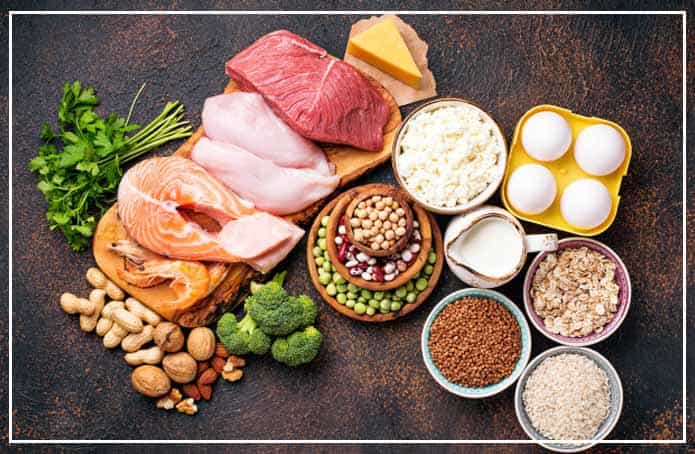
This is necessary for the development of the body and for the daily repair of our body. Deficiency of protein
Its deficiency causes problems like fatigue, weakness, retarded development, nervous weakness, etc. In pregnancy the mother’s and fetus’s tissue becomes weak and the body may collapse before the time due to lack of protein.
❍ Excess of protein
As lack of protein creates problems similarly excess of protein is also harmful. Problems created due to lack of proteins can be solved by giving extra protein but problems created by excess protein will require complete cleansing of the body. Excess of protein affects liver and kidney. Uric acid Stores in joints leading to gout and rheumatoid. It contaminates the blood. Arteries and veins are blocked with waste deposits leading to pressure on the blood circulatory system. The heart becomes weak due to high blood pressure sometimes blood vessels may burst and result in paralysis. Apart from these many minor ailments occur due to excess of protein.
Sources of Protein
Milk, dry fruit, dual seed, green peas, green leaves, etc. and soya bean are the richest in protein. According to the lifestyle led by an adult needs 50-60 grams of protein every day. Approximately the proportion should be 1 gram of protein per kilo of weight.
Children, athletes, pregnant and feeding mothers need more protein. Proteins are synthesized with the help of amino acids. It is one of the constituents of protein, there are about 80 types of amino acids, out of which 20 are essential for human metabolism for growth and development, some of them are automatically formed in the liver and the one which our body cannot synthesize are called essential amino acids.
These amino acids are arginine, cysteine, histidine, isoleucine, leucine, lysine, methionine, phenylalanine, threonine, tryptophan, tyrosine and valine. These are provided by different food items like cereals, pulses, leafy vegetables, etc.
❍ Carbohydrates in the Balanced Diet
It gives us strength and heat.
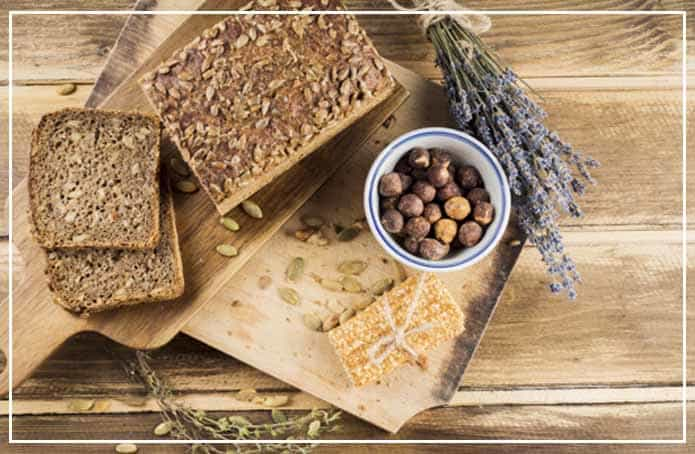
❍ Deficiency of Carbohydrates
The deficiency of Carbohydrates causes laziness, inactiveness, and lethargy.
❍ Excess of Carbohydrates
The excess of Carbohydrates increases obesity. It gets accumulated in the breathing pipe, stomach, intestine, heart and uterus in the form of toxins and gives rise to various diseases. It is of two kinds Starch and Sugar
Starch
The food which is sticky is rich in starch. Every starch converts into sugar after complete digestion and stored in the liver and muscles as glycogen.
❍ The scientist has divided them into three categories:
(1) Easily digestible (Alkaline) – It is found in banana, potato, sweet potato, papaya, pear, sapota, orange, apple, pineapple, and guava.
(2) Easily digestible (Acidic) – It is found in rice, barley, maize, and another tuber root.
(3) Late digestible (Acidic) – It is found in all types of single seed grains (wheat, Jowar, Bajra, or millet). Removing bran from these, change them fully in acid.
❍ Sugar – It is of five types-
Milk Sugar– This is required during pregnancy it is found maximum in human milk. Grape Sugar- It is found in grapes of high quality, honey and in other fruits. Scientists have called it pre-digested food as the digestive system has to do no work to digest them. That is why honey or raisin water is given as a source of instant energy.
Fruit Sugar– Usually it is found in all sweet fruits. In the plant juice, it is found as glucose, when the fruits ripen the starch starts converting into sugar. So, we should eat always ripe fruits otherwise, we will get acid instead of alkaline from the fruit. For a diabetic patient, fruit sugar is more harmless than the other one (white sugar). Its digestion occurs in the small intestine
Malt Sugar-It is found in daily eaten starchy cereals like wheat, barley, rice, maize, etc. In spite of the sugar they are rich in salt, calcium, iron, etc. and vitamins too. Its digestion starts in the mouth with saliva and completed in the small intestine.
Cane Sugar-It is the sugar made from sugarcane, it has the ability to provide heat, it is highly acidic, and it is of low level and harmful. The more we try to whiten the cane sugar, the more it loses its nutrients like calcium iron other natural salts and vitamin.
To digest sugar and to compensate for the lost nutrients, the digestive system takes calcium and Iron from our body. As a result, the body starts lacking in these items although this affects the bones of our body yet a direct effect is in the decay of teeth. Eating excess sugar produces oxalic acid which has no use in our body. When adequate calcium is not found to digest sugar then it creates havoc in the body.
Substitute of sugar – Jaggery, dates, raisin, banana, fig and mango, sweet fruits as available in season. Generally, an adult should take 200-500 grams of carbohydrates according to their physical work.
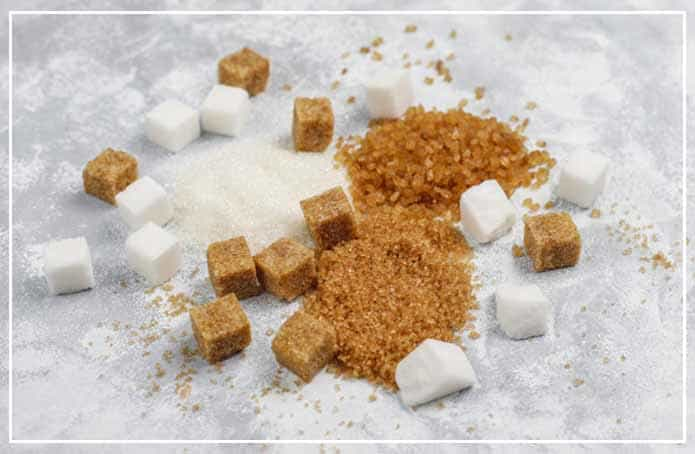
❍ Fats in the Balanced Diet
Like carbohydrates, fats also provide heat, it is the best food to provide energy, it is useful to make the skin smooth and to strengthen the bone. Without sugar, fat is not oxidized properly and continues to burn which causes tiredness in the body to digest fat, the liver, pancreas, and intestine should be in sound condition. For this deep breathing in the open air is necessary. Excess of fat gives birth to different diseases and its deficiency is compensated by the body from other food.
To activate fat in our food, iodine is necessary; otherwise one suffers from the disorder in the thyroid which results in goiter.
❍ It is of two types:
- Vegetables generated – It is found in every oil, sesame, mustard, olive, sunflower, groundnut, linseed, etc. dry fruits (coconut, almond, walnut, cashew nut, pistachio, piyalseed, and pine fruit, etc.
- Animal generated – Milk and its product, The best fat is in goat milk, then in cow milk and the last in buffalo milk
❍ Types of Fats
It is triglycerides. It is made of one molecule of glycerol and three molecules of fatty acid. It is of two types saturated and unsaturated fats.
Saturated Fats
It solidifies at a normal temperature. It is mostly found in vegetable generated fat. It is not beneficial for the body as it increases bad cholesterol and decreases the good cholesterol in the body.
Unsaturated Fats
It is in liquid form at normal temperature, it regulates the blood cholesterol, it is generally found in vegetable oil.
It is of two types Mono Unsaturated and Poly Unsaturated.
Mono Unsaturated
The body synthesizes at its own as per requirement. So it is not essential fatty acids. It falls in the category of Omega 9.
Poly Unsaturated.
These are essential fatty acid and needs to be extracted from the food. It falls in the category of Omega-3 and Omega-6.
Essential Fatty Acid
These are important for health but cannot be generated by the body so they are called essential fatty acids. These are polyunsaturated fatty acids.
❍ Functions of Essential Fatty Acids
- These activate exocrine and endocrine glands.
- These are helpful in forming hemoglobin.
- It provides lubrication to the joint.
- Functions to carry the cholesterol.
- For regular pulsation of heart, they help to generate electricity.
- Help the immune system.
- Prevents growth of allergy.
- They contribute to every activity of the body.
Important fatty acids are of two types Omega 3 and Omega 6
Omega 3 – Deficiency of Omega -3 causes:
- Retarded growth in infants children and pregnant women
- Blood pressure increases
- Possibility of blood clots increase
- Triglycerides and cholesterol LDL increases
- Heart pulsations become irregular
- Concentration in memorizing power decreases
- Menstrual problems increase
- Problems of vision
- Immunity power decreases
- The feeling of shivering in hands and legs
Sources of Omega-3 Dark green vegetables linseed, cloves, walnut, pumpkin, sprouted wheat, soya bean, unpolished rice, nuts, etc.
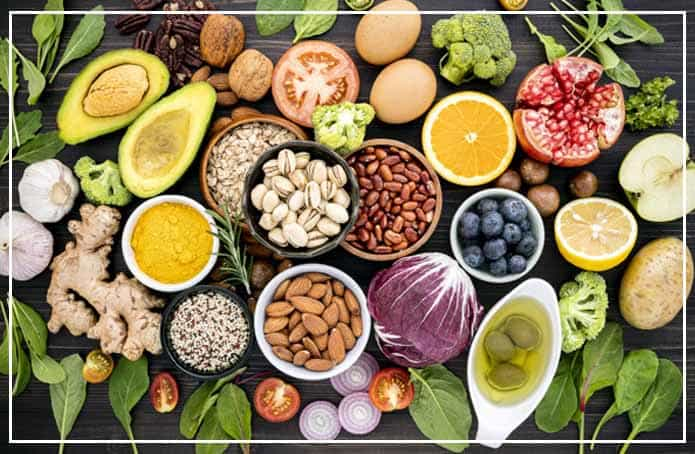
Omega 6 – Deficiency of Omega – 6 causes:
- Arthritis
- Behavioral changes.
- Skin and hair get dry.
- Dryness and itching in eyes.
- Skin eruptions like eczema started.
- Hair fall starts.
- Retarded growth.
- Hard pulsations become irregular.
- Wounds take time to heal.
- Premenstrual syndrome starts.
- May get infectious diseases.
Sources of Omega 6 – Walnut, pumpkin, grapes, sunflower seed, sprouted wheat, maize, sesame, groundnut, almond, soya bean, unpolished rice.
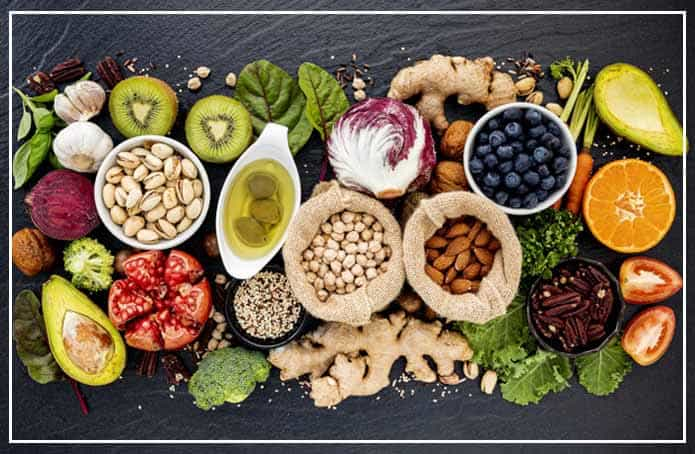
Trans Fats
It is not beneficial for the body as it increases bad cholesterol and reduces the good cholesterol in the body. They increase obesity and diabetes. They are mainly man-made. When vegetable oils are converted into refined oils by a chemical process, they get converted into trans fats, even when they are boiled or fried they get converted to trans fats. 4% of trans fats are also found in animal milk.
So oil should not be used in cooking or frying. The requirement of oil in the body can be fulfilled by uncooked food, by just eating a piece of coconut, some groundnut, walnut or some Sesame.
❍ Vitamins in the Balanced Diet
Vitamins are those organic substances that are essential for many activities of the body; they can be obtained from the food. Vitamins in the food get destroyed by boiling excessively or by cooking in a wrong way.
Vitamins are classified into two groups:
Water-soluble- As the body cannot store them so their daily supply to the body is essential like Vitamin B complex, vitamin C, vitamin U, etc.
Fat-Soluble- The body can store them; they are vitamins A, O, E, F, P, etc.
Our body has the capacity to generate some vitamins. There are some useful bacteria in our intestine which secretes vitamins for the body, they are Vitamin B, E and K. Antibiotic medicines destroy these useful bacteria hence there arises deficiency of these vitamins in the body. All vitamins get destroyed after the use of antibiotics, in little or more proportion due to heat, by coming in contact with air or due to the storage of food. Vitamin C is destroyed very quickly. Vitamin A can bear a little heat but during open cooking, it gets destroyed immediately.
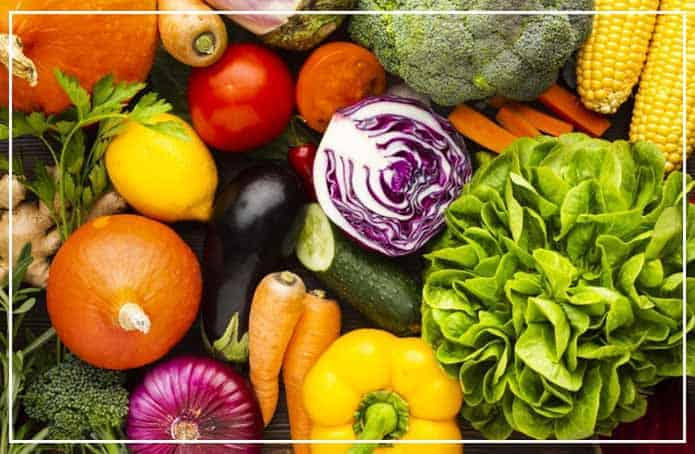
❍ Natural Minerals in the Balanced Diet
These are essential for cleansing, construction, and development of the body. These are also essential for the assimilation of food; there is no part in the body that can function without natural minerals. No gland, no part of the digestive system and no digestive juice in the body can perform properly the function of blood circulation and nerve impulses, without the help of natural minerals.
- Out of different elements, essential elements for a normal body are as follows: calcium 1000 gram
- Phosphorus 780 gram
- Potassium 140 gram
- Sulphur 140 gram
- Chlorine 95 gram
- Copper 72 gram
- Magnesium 19 gram
- Iodine 13 gram
- Manganese 12 gram
- Iron 4.2
- Fluorine 26 gram
- Zinc 2.3 gram
- Chromium 2.0
- Cobalt 1.5 gram
❍ Fibers in the Balanced Diet
It acts as a Broom in the digestive system, cleaning of the intestine is impossible without it, so its presence is necessary. In our diet lack of it causes constipation, which is a root cause of all diseases.
Sources – It is found in each type of fruit, vegetable, cereals, and flora. It mainly remains in outer parts of the food, so we should eat wheat with bran, pulses with peels; it is in plenty in isabghol bran, fig, bel, and raisin.
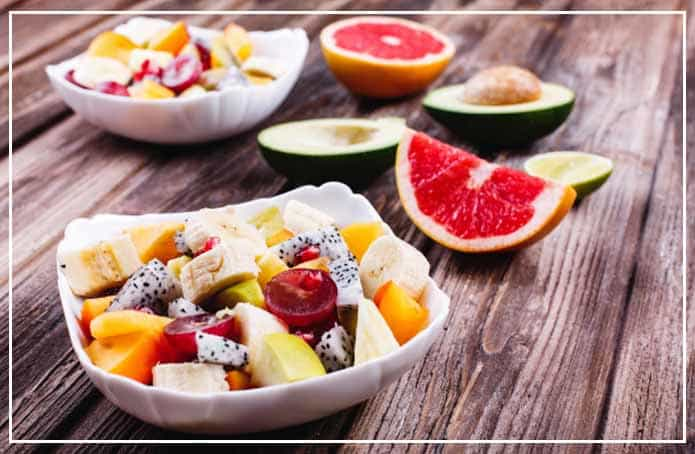
❍ Water in the Balanced Diet
70% of our body weight is water. Our body needs 1-7 liters of water every day. The requirements depend upon our nature of work, humidity, temperature and other conditions. On average a man needs 8-10 glasses of water every day. Approximately 20% of the water we get from food other than 80% we get from drinking juice and water.
Water comes out from the body in the form of sweat, urine, stools, and breath. Water used for drinking and bathing should always be at the same temperature as the body, cold water damages the digestive system, and during meals, we should not drink water.
Nowadays instead of water, tea, coffee, sugar beverages, and synthetic drinks are served these are harmful to our body. If we want to drink something else instead of water drink fruits or Vegetable juice, coconut water, and other such organic juices.
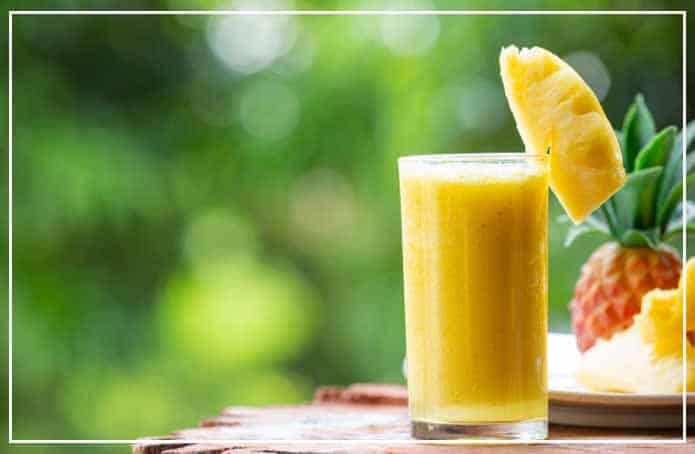
“Eat Healthy and Live Healthy”
❖ Read More:
➥ If Suffering From Diabetes or Gestational Diabetes Stick To Healthy Diet Plan for Healthy Pregnancy
➥ Healthy Foods Appreciated By Heart
➥ Fruits for Good Healthy Glowing Skin
➥ Top 10 Healthy Breakfast Foods
➥ Foods: Healthy Eyes With A Healthy Diet

